Sometimes the latest news in the world of American music is carried to Europe on a wave of enthusiasm. That is what happened in 2019, when a Korean conductor still just under 40 made her debut at the San Francisco Opera. Stories of her success poured out of the War Memorial Opera House that night, hailing the arrival of a new star conductor.
It came as little surprise when Eun Sun Kim was named San Francisco Opera’s next music director before the year was out. Her contract was initially for five years starting August 2021, a period that was to take in the company’s re-emergence from the pandemic and its centennial season in 2022-23, and the term has already been extended. Kim, only the fourth music director in the company’s history, will remain in post at least until the end of the 2030-31 season. Evidently, San Francisco is not going to let her go easily.
Her contract stipulates six months of the year with the company, which leaves the other half for guest conducting. Her next guest engagement is at the Royal Opera, Covent Garden, where Kim will make her debut in the forthcoming revival of Tosca, a keenly awaited event since she has been seen little in the UK.
A career that involves hopping from one opera house to the next can be challenging, but Kim says she has discovered the secret. “For me, the advantage of being able to travel so much is that I sleep really well,” she says. “Before San Francisco, I only did guest conducting in Europe, where the opera houses are closer to each other. I would do six performances at three different opera houses in a week, popping in and out from one airport to another, and that is how I trained myself.”
Her artistic journey began in Seoul, where she studied the piano from the age of four. Her mother recognised that she had a special talent when she began picking out tunes she had heard on the radio. At college, she started out in the composers’ class, but one of her teachers encouraged her to conduct, and from there she never looked back. A move to Stuttgart to immerse herself in European culture was the next step.
“The reason I wanted to go to Germany after my graduation in Seoul was simply to walk in the path of classical composers,” she says. “Speaking other languages [Kim is fluent in English, German, Spanish, Italian and French] is important to me, because each composer is storytelling in his own language and that means each tells the story at a different pace.”
Those early years of her conducting career tested her mettle. Having started as a student in Stuttgart, she made her professional conducting debut in 2012 with a performance of La Bohème in Frankfurt, for which she had no rehearsals (“You just walk in on the evening and conduct”). She reached the summit of German musical life, her debut with the Berlin Philharmonic, earlier this year.
“Imagine that I am on the conductor’s podium and need to explain something in a Wagner opera to German musicians. When I was young, players would have questions about the score and of course they were thinking, ‘Does she really understand our culture?’ or ‘How deep is her knowledge?’ I have always said that I think it is natural [to ask such questions] when I am standing in front of them. I would have the same reaction if [a western conductor] came to Korea and wanted to explain the Korean tradition of music to me.”
The advantage of being music director in an opera house as large as San Francisco (capacity 3,146 seats) is that she gets the biggest projects for herself, and that means, above all, Wagner. Tannhäuser came first, Tristan und Isolde has just finished, Parsifal comes next year, and a Ring cycle, the ultimate challenge, is projected for a future season.
This autumn’s performances of Tristan und Isolde have given her the opportunity to delve deeper into Wagnerian music drama with musicians she knows. “The joy of doing live performance is that it’s different every night and the performance evolves organically as everyone gets immersed in the piece,” she says. “What a score! How did one person compose this music, not just because of its length but also its complexity, as well as all the texts? I want to know what kind of brain that was.”

Like many other opera houses currently burdened by financial problems or audience numbers that have not recovered from the pandemic, San Francisco has its challenges. Kim does not pretend to know the answers, but is clear where she sees the way forward.
“I might be naive, but I believe in the art,” she says. “If we provide good quality — no, not just good, but extraordinary — then the audience will come. If we keep shrinking [the number of operas] and cutting the budgets, that’s not the answer. Just getting smaller and performing less and less doesn’t help us to get that quality.”
She cites a concert of Beethoven’s Symphony No 9 given earlier this year by San Francisco Opera chorus and orchestra. It was sold out within hours, she says, and there were no tickets for the company’s patrons, so the dress rehearsal had to be opened for them.
“Live performance is not like Netflix or YouTube. This is where human beings gather together, and though we observe things differently and have different takeaways from the event, the 3,000 people there will remember that moment of live performance. In Beethoven’s Ninth, after the chaos, the music of the fourth movement is all about optimism. In my time I was supported by the older generation, my teacher and my mentors. Now I want to do the same for the next generation to keep our live performance industry going forward for the future. Yes, I am an optimist.”
‘Tosca’, Royal Opera House, London, November 26-December 13, rbo.org.uk
Find out about our latest stories first — follow FTWeekend on Instagram and X, and subscribe to our podcast Life and Art wherever you listen









